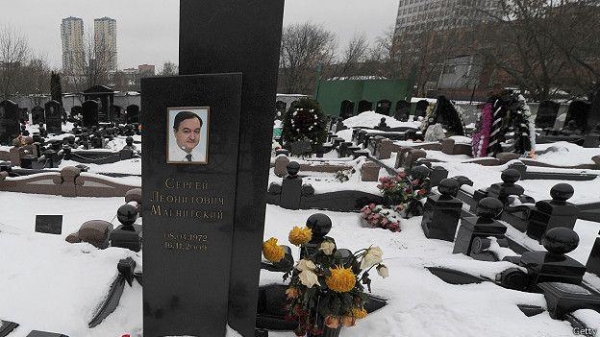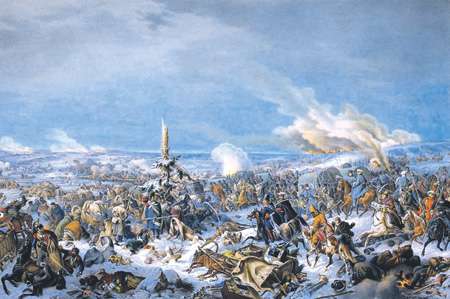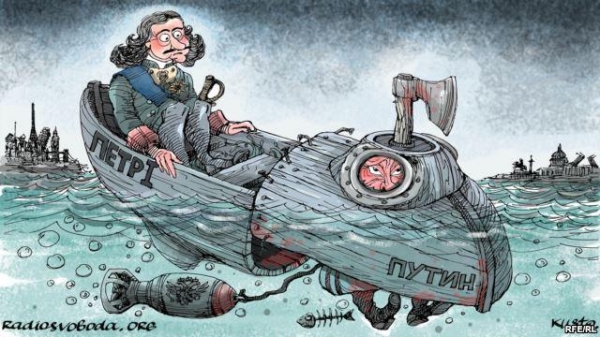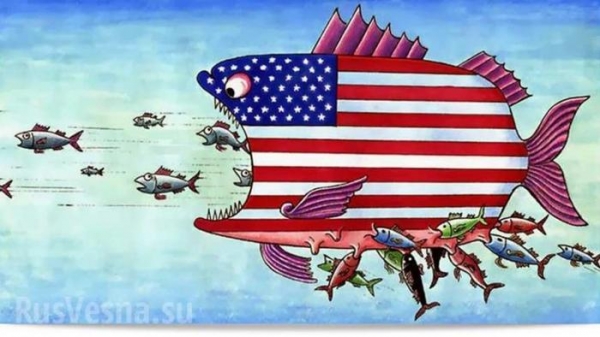
Russian character, repeatedly sung in Russian literature, and also repeatedly trivialized Patriotic officialdom, it seems, still exists as something real, not only as a beautiful legend. I’m not willing to go as far as film Director Nikita Mikhalkov, who believe that it explains a lot, but still inclined to believe that at least something that explains.
Of course, the theme seems to be closed forever by Fyodor Tyutchev, which is exactly 150 years ago (this year just the anniversary) was more straightforward that the mind can not understand Russia. However, as for the past half century, heart or any other place to understand Russia is also not very turned out, Willy-nilly has to strain the mind, which Tiutchev completely refused to trust. In the end, yet in Russia no harm in trying.
The habit of returning
The Russian story has a problem: she keeps coming back in the same rut. More precisely, the story no problem, of course not: how it flowed, and flows through her one slave channel. Problems arise for those who are trying this story to interpret from a rational, that is “European” (in different wording – “Westernizing”) positions, believing that in Russian history there is a hidden purpose, and this purpose consists in the fact that Russia was finally “Europe”.
Here it should be noted that Russian history often played with his commentators in the cat-and-mouse, from time to time demonstrating the obvious desire to be the same like in Europe. However, every time after that the flirting was that of hope “Westerners” were illusory, and Russia was reborn, albeit in some completely new guise, but always an autocratic Empire.
Russian code
These departures and returns excited the imagination of many generations of researchers of Russia, from the authors of the famous “Milestones” and ending with the legendary Richard pipes. However, to explain it really so far no one and failed. Anyway, all explanations boil down to the hypothesis of the existence of some unchangeable of the Russian “cultural code”, which, as the matrix of a historical DNA, again and again reproduces the same combination of economic and political elements. However, this hypothesis exactly as many detractors as supporters.
If someone wants to achieve in Russia is to practice really large-scale transformations, he needs to take care first and foremost about a change in its “culture code”
And yet, if we accept the existence of the “Russian code” as a kind of hypothesis, we must admit that Russian culture somehow determines the boundaries of the possible at this stage of economic and political change, firmly cutting off all that goes beyond the current cultural paradigm.
Thus, if someone wants to achieve in Russia is to practice really large-scale transformations, he needs to take care first and foremost about a change in its “culture code” and thus create the Foundation for a deeper and more sustainable changes in the economic and political systems. In other words, from all kinds of cultural revolutions revolution continues to remain for Russia the most important.
Sequencing of the genome of the Russian
 Image copyrightGETTY
Image copyrightGETTY
Image captionАндрей Konchalovsky has long been engaged in the idea of decoding the “Russian cultural code”
The idea of this article, and quite long ago, suggested to me the selfless activity of Andrei Sergeyevich Konchalovsky. For many years he is a vigorous lobbyist of the idea of decoding the “Russian cultural code”, from my point of view, quite right in believing that without a thorough “cultural genetic engineering” (in his terminology – “cultural indoctrination”) to tackle the Russian society the problem of modernization of all sides of her multifaceted life will not be easy.
Konchalovsky has made many efforts in order to discover and articulate the basic, in his opinion, the characteristics of the Russian “cultural code”. After Harrison, Huntington and other Western representatives of the “civilization” of the historical school he brings them (the characteristics) of the nature of “peasant societies”, meaning, first of all, peculiarities of social behavior: short radius of trust among members of society outside the family, low level of social responsibility and so on.
While acknowledging these and other features of social behavior, I, however, believe that an even greater and fundamental importance in the structure of Russian “cultural code”, play a particularly Russian thinking, which may predetermine the above-mentioned social norms and stereotypes. Russian mentality determines the Russian sociality, and for that reason alone deserves close attention.
The logic of Russian myth
Of course, the Russian mentality isn’t the first time it appears in the center of public attention. As a rule, discussions about the “Russian character” actively unfold when Russia is going through some major historical cataclysm. More about the peculiarities of Russian mentality spoke and wrote immediately before and immediately after the Bolshevik revolution. At the same time started talking seriously and mythological Russian consciousness.
People in the grip of mythological thinking, no reasoning, his ideas about the world and about ourselves would appear as immediately ready to use.
In fact, nothing bad in the mythological consciousness is not: this is the starting point from which began all the peoples of the world. Just not everything on it was delayed for so long, many still went ahead, mostly by (but nowhere fully) the transition from the mythological to the logical mind.
In Russia this transition has not worked. The lack of development of the logical consciousness, dislike of thinking and even fear of thinking, dogmatism, and dogmatism are the generic traits of the Russian mentality, which was noted by many representatives of the Russian historical and philosophical schools at the turn of XIX and XX centuries. It is highly symptomatic that today the interest to this problem is growing again, it is evident even from a cursory review of publications on the topic and discussions on the Internet.
From a mythological consciousness, as historically the first form of thinking, has its own unique features. Among other things it is notable for the imagery, immediacy and sensuality. People in the grip of mythological thinking, no reasoning, his ideas about the world and about yourself would immediately arise as, in the finished form in the format of undisturbed by a logical analysis of the images.
These images are so fresh and immediate that the person finds it difficult to draw a clear line between reality and its reflection in his own brain. For “human mythological (“mythical homo”) and his ideas about reality – it is reality. Conversely, reality is just his idea of it. This is to remember all those who so surprised the effectiveness of state propaganda in Russia. Experiences of a Russian person so it’s always very emotional (he generally characterized by high empathy – the ability to soperejivanie), because it is directly tied to sensory perception and intuition, rather than “expressed” through the sieve of logic experience.
It is the “undigested” mythological, not replace logical thinking, and determined, in my opinion, many basic properties of the “Russian character”. Local historians and philosophers have done for 100 odd years that have passed since that day, as Tyutchev made the final judgment, the great work of codification features of the “Russian spirit”. Therefore, do not pretend to be comprehensive, nor to novelty, will focus only on those three cross-cutting properties that today I najdutsja main: fatalism, illogic and relativism.
Of course, we are not talking about something exceptional that is characteristic only of the Russian people and not in the nature of other peoples. It is rather in proportions and ratios that make a Russian cultural paradigm unique.
Fatalism
 Image copyrightTHINKSTOCK
Image copyrightTHINKSTOCK
Image captionРусские colonized huge, not very fit for living spaces
I’ve had to write about fatalism, which, in my opinion, is both a unique source of the resilience of the Russian spirit, and the cause of centuries of chronic diseases Russia. Russian fatalism is, of course, religious “Orthodox” roots. But he also formed and as a consequence of “mastering” the Russian people of their difficult and contradictory historical experience. Russian man believes in destiny more than in himself.
Russian bad are lucid and thoughtful historical actions, but they are able to do great historical deeds.
As substantially Russian mythological consciousness of representation about the world are formed in large part subconsciously, and “swam” in the region in a conscious form is almost ready and difficult to change images, then this consciousness characterized by similar perception of the world as something static, once and for all this, and therefore almost entirely deterministic.
Russian – fatalists doubly when it comes to public and political life. They are antisocial, because they are a priori alien to the idea that they can what to influence in their own country. That is why they deeply care about politics, which they attended sporadically and stupid. This, however, does not mean that Russians are generally passive. Not at all, but Russian man does not see feedback from the surrounding political world, he’s not interested in parties, elections, political struggle. As if he knows in advance that he deceived, and used to take this hoax for granted.
Russian fatalism is a special kind. In contrast to the Eastern fatalism, it is not contemplative, but active. Russian – “active fatalists”. They do not expect mercy from nature, and always ready to take from nature all that is possible, and even that is impossible. As a consequence, Russian fatalism is rebellious, he does not lulls, and wakes. It makes Russian people to go forward all the time, not looking and not speaking. This allowed the Russians to colonize a huge, not very fit for normal living space, to create in these spaces the Empire and defend its independence in countless wars.
However, Russian fatalism useless “in everyday life”. In Russia build “at random”, but Russia can not be “at random” to equip. Russian, being a active people, are not people of action. It drew the attention even Bitter, firsthand watching the everyday life of the Russian revolution in St. Petersburg.
Russian bad are lucid and thoughtful historical actions, but they are able to do great historical deeds. No reform in Russia has not been successfully brought to its logical end, but revolution and war, glorified the Russian forever. Russian easily go to death and the feat, but the organization of their everyday life seems to them an impossible task.
Illogic
 Image copyrightGETTY
Image copyrightGETTY
Image captionПо one channel say lawyer Sergei Magnitsky died in prison from illness, and on another – that was killed in the same prison American spies
Russian thinking is paradoxical. Within preserved mythological perception of the world Russian people has a unique ability not just to Express simultaneously two mutually exclusive statements, but also does not experience any mental discomfort. Orwellian world, which, as we know, is war – this is Russian world. For the Russian people to simultaneously say that white is black and that black is white, in principle, fine.
Russians are perfectly familiar with formal logic and successfully used it, but only in applications.
Russian ear does not hurt, when one channel of the state television saying that has become an iconic figure of the political life of the Russian lawyer Sergei Magnitsky died in prison by accident from undetected diseases, and on another report that he was killed in the same prison American spies. That prison was a Russian, moreover, does not bother anyone. In Russia such things are easy to ignore as another paradox of Russian life.
Thanks to the illogic of consciousness people survive pretty well in the terms “doublethink” and “doesmake” Russian life, where there are two adjacent truth, two morals and two acts “written” and “conceptual”. Russian General from the very nature dialectical, they can easily grab any interpenetration of opposites. Mental flexibility for many centuries allowed them to adapt to an autocratic dictatorship (no matter how it was called) and not go crazy.
There is an opinion that Russian bad given formal logic (this statement can often be found in the West or among the Russian “Westerners”). I think that this is a mistaken view, Russian excellent command of formal logic and successfully used it, but only in applications: the proof lies at hand in the form of the Empire at one-seventh of the land (and more). But they have learned from their formal logic “agree” and ” off “out of circulation” when it interferes with their adaptive abilities.
Unfortunately, these adaptive mechanisms work well on short to medium ranges, but in the long term, they lead to the need of permanent revolutionary painful corrections. And then in the end, what happens is that Victor Chernomyrdin, one of the most paradoxical thought and speaking figures postkommunisticheskoi Russia – called: “Never such was and here again…”
Relativism
As in the mythological consciousness view of the world and the world itself are the same, then Russian is difficult given the absorption of what is “objective truth”. Deep down, many Russians sincerely doubt its existence. Subjective opinion of the Russian people about the reality and is for him reality itself.
Truth is subjective truth, which may well be false, but it does not matter if there is a subject ready to believe it.
The reverse side of subjectivity of the Russian consciousness is daydreaming. Russian fantasy has a huge space for flight, so how much less than in other European Nations that have passed through the drill logical perception of the world is limited to something external. She practically unlimited, except internal intentions. Russian man is able to believe fervently in a story, especially facing the future (a lot written about it Nikolai Berdyaev). The entire history of Russian communism – the proof.
Unfortunately, the reverie of the Russian people it’s easy to use, it costs nothing to deceive, because he is inwardly inclined to grab any fantasy, for the most that neither is a rollicking fiction, and believe in it fervently, almost religiously. While characteristic of Russian “doublethink”, which was discussed above, is manifested in this case in particular perverted form. Even knowing that a certain statement is, if not a lie then certainly a fantasy, Russians have a remarkable ability to completely oust from his consciousness deep into the subconscious is a uncomfortable knowledge. Only in Russia you can meet so many people who are lying first, and then sincerely believe that they also invented the lie is the truth.
Ultimately, it all found its linguistic expression in the separation of the concepts “truth” and “truth” is almost impossible in rational Europe and considered to be difficult to explain. Nothing difficult here. Truth is subjective truth, which may well be false, but it does not matter if there is a subject ready to believe it.
Russian mentality and the Russian social
 Image copyrightTHINKSTOCK
Image copyrightTHINKSTOCK
Image captionСправедливость exists only in fairy tales?
Features of the Russian mentality largely determine the features of Russian social, which is so much attention to Andrei Konchalovsky. I think there is easily enough derived from the other. Thus fatalism is the core on which all else is strung.
What responsibility can carry a person for what is a foregone conclusion that still cannot be changed?
Russian fatalism makes selfish and minimizes the notorious “radius of trust” among people. Doubting the importance of their own individual actions, the Russians absolutely have no respect for the actions of the collective. They demonstrate a blatant unwillingness to engage in cooperation with each other. In any collective endeavor, they will “pull the blanket on himself”. On this property the Russian character has repeatedly drawn the attention of the philosopher Ivan Ilyin. Russian is no more alien idea than the idea of self-restraint and the idea of cooperation. The will, not freedom – that’s their ideal.
Further, the Russian fatalism makes hostages of the permanent crisis of confidence. “Cooperatively” causes them to see in others only a hindrance, not a means to an end. Many Russians believe that justice exists only in fairy tales that if you don’t cheat first, then immediately become a victim of fraud if you do not push the elbow in the middle, it will be overwritten by the crowd. Russian society is very hard and even fierce competition.
Finally, fatalism makes no sense developing a sense of personal responsibility. What responsibility can carry a person for what is a foregone conclusion that still cannot be changed? All, and I, what with all the demand, and such with me. The concept of man-a cog in this sense, is very Russian.
The clash of cultural paradigms
These properties of the Russian character in themselves neither good nor bad. It (nature) the shortcomings are the continuation of its merits, and Vice versa. All the same fatalism, the illogic and relativism has enabled the Russians to build a civilization where other Nations would have long ago dropped his hands. But these same properties and doom this civilization on the complicated non-linear development with a perpetual cataclysms and walking around the historic circle. Unfortunately, as is often the case in life, bad you can not just go and tear from good.
All the same fatalism, the illogic and relativism has enabled the Russians to build a civilization where other Nations would have long ago dropped his hands.
On the one hand, the existing cultural paradigm imposes very significant restrictions on the choice of scenarios of historical development of Russia. Much of what Europe feels natural, for this reason in Russia it is impossible to imagine. On the other hand, in such unspoiled cultural change a country like Russia even the most minimal cultural progress can lead to the unthinkable, the fantastic shift of social and political formations, opening up perspectives that today no one sees.
If you do not pamper the body with antibiotics, their use in a critical situation can be very effective. A small shift of cultural paradigms in Russia at the turn of XIX and XX centuries led to the social explosion of such power that changed not only Russia but the whole world (of course, this change was very controversial).
Of course, culture is very conservative, and changes in it occur very slowly and certainly not under the order. But, as history shows other Nations, and the history of Russia, too, shifts from time to time happen. Otherwise Europe would always be what she saw Atilla. Unfortunately, these changes tend to occur suddenly and abruptly. People living on the volcano’s guess that sooner or later he will Wake up, but you never know the exact time. Cultural collisions on the platforms we know even less than you about the movement of tectonic plates of the Earth…
That the Germans well, the Russian death
For most honest and courageous people who sincerely desire to see Russia a free and contemporary, where “each right has the right that “left” and what is “right”, any conversation about the “Russian character” of “Russian cultural code” that is on the special properties of the Russian culture in General and about its determining and limiting role in Russian history is, oddly enough, a very strong stimulus with a pronounced negative connotation.
Maybe Russia will come to Europe (I would like to believe it), but it will be some other, its own Europe, not very similar to the one you hold for a sample of Russian “Westerners”.
This is unlikely to contribute to the speedy transformation of Russia.
We used to read Leskov from East to West, with regret treating poor “German”, which may die from the fact that Russian is good. Alas, but the words Leskov with the same success can be read from West to East: what the Germans well, maybe for a Russian to be very bad. The problem with “Westerners”, which, I believe, genuinely show care for the European choice of Russia, perhaps, is that, on the one hand, at least they still urge Russia to make the “European choice”, but they behave in the same way that Russia is this choice made long ago and is an ordinary European country, only something misunderstood.
Unfortunately, the “European way” between the selection point and the destination is a huge distance that must be overcome, in accordance with real and not fictional cultural terrain. Otherwise, you can crash into some undetected historical slope and jump to her death. And though about understanding the Russian mind, I’d Tiutchev argued, but in the application to Russia of the common yard, I’m ready to agree with him. Maybe Russia will come to Europe (I would like to believe it), but it will be some other, its own Europe, not very similar to the one you hold for a sample of Russian “Westerners”. And it will come back very winding, difficult and long time before by (Putin, by the way, is not even a boulder, and a tiny chip along the way).
Russian “Westerners” want to convince the Russian people of the usefulness of European values, relying on his rational choice. Considering the above-described mental characteristics of the people, the supporters of the “rational choice theory” will have to wait very long. Russian people, as a woman, it is necessary not to convince but to impress. Otherwise as Sergei Dovlatov: can be long to tell the Russian people about his great European future, lead to reasonable arguments, to make economic calculations, draw tables and graphs and, in the end, discover that he just disgusted with the tone of your voice…








